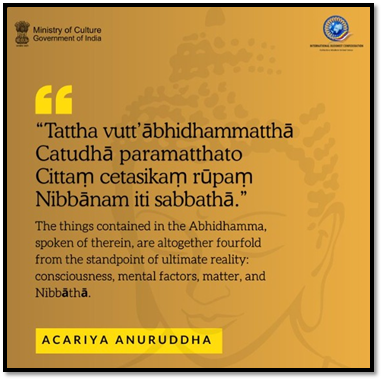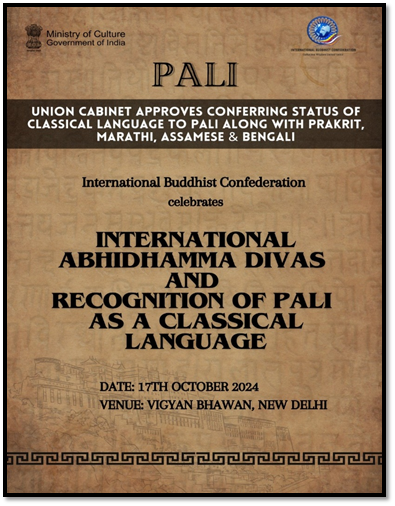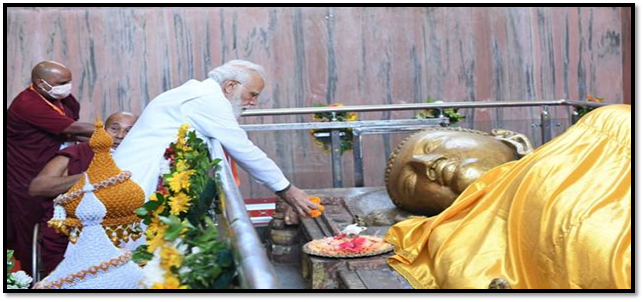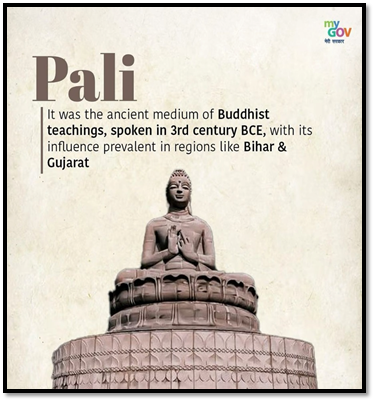Others
International Abhidhamma Divas
Posted On:
16 OCT 2024 3:45PM
Introduction
India, the birthplace of Buddhism, holds an enduring spiritual legacy as the land where Gautam Buddha attained enlightenment and shared teachings that continue to shape human understanding.
The country's historical and cultural connection to Buddhism is reflected through the veneration of sacred sites, including Bodh Gaya, where Buddha achieved Nirvana. These sites are not merely places of worship but living symbols of the Buddha's journey toward liberation, inviting seekers to walk the same path of introspection and peace.
Central to Buddha’s teachings is the Abhidhamma, a profound philosophical component that extends beyond ethical conduct into the realms of mental discipline and self-awareness.
International Abhidhamma Divas
International Abhidhamma Divas, observed globally, celebrate this philosophical cornerstone, recognizing its timeless relevance in guiding ethical conduct and mental discipline. The occasion underscores the enduring bond between Buddhism and India, where Buddha’s teachings continue to inspire not only spiritual seekers but also those pursuing a life of mindfulness and inner peace. The Divas serves as a reminder of India's unique role in preserving and promoting the legacy of Buddhism to the world, a bridge between ancient wisdom and contemporary spiritual practices.
Historical Background and Significance
Abhidhamma Divas commemorates the day when Lord Buddha descended from the celestial realm, Tāvatiṃsa-devaloka, to Sankassiya (now Sankisa Basantapur) in Uttar Pradesh. The Asokan Elephant Pillar, a historical marker at the site, marks this significant event. According to Theravāda Buddhist texts, Lord Buddha spent three months teaching the Abhidhamma to the deities in Tāvatiṃsa, including his mother. The celebration of Abhidhamma Divas coincides with the end of the first Rainy Retreat (Vassa) and the Pavāraņā festival, a time when monks and nuns conclude their retreat period with a ceremony.[1]
Teachings of Abhidhamma
 The Abhidhamma, or "Higher Teaching" of the Buddha, provides a profound and systematic analysis of mind and matter. Unlike the more conventional teachings in the Sutta Piṭaka, which use everyday language, the Abhidhamma adopts a specialized and analytical approach to explore reality. It offers a detailed framework for understanding the nature of existence, addressing the processes of birth, death, and mental phenomena in a precise and abstract manner.
The Abhidhamma, or "Higher Teaching" of the Buddha, provides a profound and systematic analysis of mind and matter. Unlike the more conventional teachings in the Sutta Piṭaka, which use everyday language, the Abhidhamma adopts a specialized and analytical approach to explore reality. It offers a detailed framework for understanding the nature of existence, addressing the processes of birth, death, and mental phenomena in a precise and abstract manner.
To convey these intricate concepts, the Abhidhamma developed a specialized vocabulary in Pali, forming the basis of Buddhist philosophy and psychology. Key terms include "citta" (consciousness), "cetasika" (mental factors), "rūpa" (materiality), and "nibbāna" (final liberation). This technical language serves as a guide to gaining insight and achieving liberation, facilitating a deeper understanding of ultimate realities and the workings of the mind.
Traditionally, it is believed that Buddha first taught the Abhidhamma to the gods in the Tavatimsa heaven, including his mother, and later conveyed these teachings to his disciple Sariputta, who expanded upon them in the six core books of the Abhidhamma Piñaka. These texts cover various topics, such as moral and mental states, aggregates, causal relationships, and the path to emancipation, forming a comprehensive system for understanding the mind and achieving spiritual growth.
The seven treatises of the Abhidhamma Piñaka, notably the Paññhāna, delve into causal relations with unparalleled depth, showcasing the Buddha's profound insight. The meticulous analysis provided by these texts has made the Abhidhamma an essential tool for practitioners seeking to develop insight and grasp the essence of Buddha's teachings.[2]
Modern Observance and Celebrations
On October 17, 2024, Vigyan Bhavan in New Delhi will come alive with the celebration of International Abhidhamma Divas, hosted by the Ministry of Culture in collaboration with the International Buddhist Confederation (IBC). The event will hold a special significance this year, following the recent recognition of Pali as a classical language by the Indian government, alongside four other languages.
Prime Minister Shri Narendra Modi will lead the auspicious day's proceedings. He will share his reflections on the enduring relevance of Abhidhamma Divas and the role of Pali in preserving Buddha Dhamma. His address will highlight the government's initiatives to promote India's rich Buddhist heritage and efforts to ensure the conservation of this ancient wisdom.
The celebration will bring together around 1,000 participants, including ambassadors, monks, scholars, and young experts from 14 countries. Prime Minister Modi's address will emphasize the continued relevance of Abhidhamma teachings and efforts to preserve Pali as a classical language.
The day's program includes a Dhamma discourse by Most Ven. Panyarakkhita and two academic sessions exploring the themes "The Significance of Abhidhamma in the 21st Century" and "The Origin of Pali Language and its Role in Contemporary Times."[3]
 There will be two exhibitions during the event, one on the evolution of Pali from Ashokan Brahmi script across Southeast Asia, featuring important Buddhist texts like Dhammapada and Dhammacakkapavattana Sutta, and the other focusing on "The Life and Teachings of Buddha." The event will provide a platform to celebrate Buddhist teachings, promote India's Buddhist heritage, and connect ancient wisdom with modern societal challenges.
There will be two exhibitions during the event, one on the evolution of Pali from Ashokan Brahmi script across Southeast Asia, featuring important Buddhist texts like Dhammapada and Dhammacakkapavattana Sutta, and the other focusing on "The Life and Teachings of Buddha." The event will provide a platform to celebrate Buddhist teachings, promote India's Buddhist heritage, and connect ancient wisdom with modern societal challenges.
Together, these exhibitions and academic sessions highlight the Abhidhamma Divas as a platform not only to celebrate Buddhist teachings but also to foster a deeper understanding of their impact on modern society. It celebrates the timeless teachings of Lord Buddha while emphasising the significance of preserving Pali as a cultural treasure.
Previously in 2021, Prime Minister Narendra Modi took part in the International Abhidhamma Day celebrations at the Mahaparinirvana Temple in Kushinagar. It is an important Buddhist pilgrimage site in India known for being the place where Lord Buddha is believed to have attained Mahaparinirvana. The event took place on Ashwin Poornima, a full moon day that holds special significance in Buddhist tradition.
In his address, Prime Minister Modi reflected on the enduring relevance of Buddha's teachings. He emphasized that Buddha's message of compassion and responsibility could help guide humanity in overcoming issues like climate change. Highlighting the unifying nature of Buddha's teachings, which transcend borders and connect cultures, the Prime Minister also recalled the historical ties between India and Sri Lanka, citing the spread of Buddhism to the island by Emperor Ashoka's children, Mahendra and Sanghamitra. India's organization of such events underscores its dedication to revitalizing Buddhist studies and preserving ancient knowledge for contemporary society.[4]

Classical Status to Pali language
The story of the Abhidhamma and its profound teachings is deeply intertwined with the ancient Pali language, a sacred medium that has preserved the essence of Buddhist wisdom for centuries. Recognized recently as a Classical Language by the Government of India, Pali highlights its literary significance within Buddhism and Jainism. It is believed that this ancient language, shaped from various dialects, served as the vehicle for delivering Lord Buddha's teachings around 500 B.C., ensuring that his insights could resonate through time.
The entire body of Buddhist canonical literature is written in Pali, with the Tipitaka or "Threefold Basket" being its most notable collection. This includes the Vinaya Pitaka, which outlines ethical monastic rules, the Sutta Pitaka, a rich compilation of the Buddha's discourses, and the Abhidhamma Pitaka, which delves into ethics, psychology, and the intricate analysis of mind and reality. A rich commentarial tradition has developed around these texts, with works such as the Aṭṭhasālinī and Sammohavinodanī being crucial for understanding the nuanced teachings of the Abhidhamma, all composed in Pali.
 Moreover, Pali literature encompasses the Jataka Kathas, which recount the stories of the Buddha's previous lives, reflecting shared moral values prevalent among the Indian populace. The conferral of Classical Language status to Pali is not just an honor; it paves the way for revitalization efforts. Government initiatives aimed at promoting Pali studies in educational institutions are set to enhance research on its historical significance, ensuring that the literary heritage of Buddhism is preserved for future generations. [5]
Moreover, Pali literature encompasses the Jataka Kathas, which recount the stories of the Buddha's previous lives, reflecting shared moral values prevalent among the Indian populace. The conferral of Classical Language status to Pali is not just an honor; it paves the way for revitalization efforts. Government initiatives aimed at promoting Pali studies in educational institutions are set to enhance research on its historical significance, ensuring that the literary heritage of Buddhism is preserved for future generations. [5]
The preservation of the Abhidhamma teachings has heavily relied on the scholarly and liturgical status of Pali. Monasteries and educational institutions have played a crucial role in keeping the Abhidhamma tradition alive, with dedicated scholars and monks engaging deeply with these texts. This connection not only honors the historical importance of Pali but also encourages a renewed engagement with the insights embedded within its texts, fostering a deeper understanding of the Abhidhamma's relevance in today’s world.
Conclusion
The International Abhidhamma Divas, coinciding with the recognition of Pali as a classical language, represents a significant stride in India's efforts to preserve and promote Buddhism's rich legacy. By granting classical status to Pali, India acknowledges its historical significance and ensures that the profound wisdom of Buddhist scriptures continues to inspire future generations.
This celebration aligns with India's broader mission to revive interest in Buddhism. It fosters scholarly exchanges and global engagement while reinforcing the nation's role as a key center for Buddhist studies. Through such initiatives, India nurtures a deeper appreciation for the enduring teachings of Lord Buddha.
Reference
International Abhidhamma Divas
****
Santosh Kumar/ Ritu Kataria/ Kamna Lakaria
(Backgrounder ID: 153285)
Visitor Counter : 4600
Provide suggestions / comments